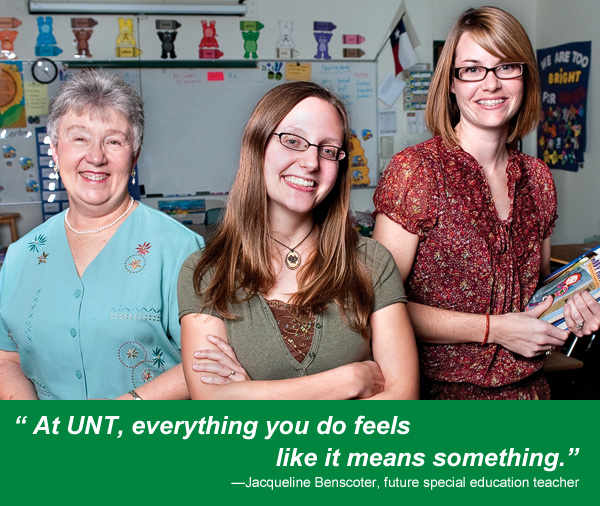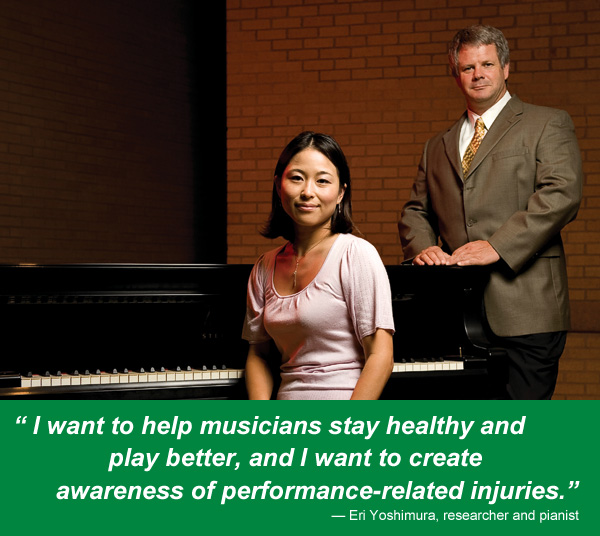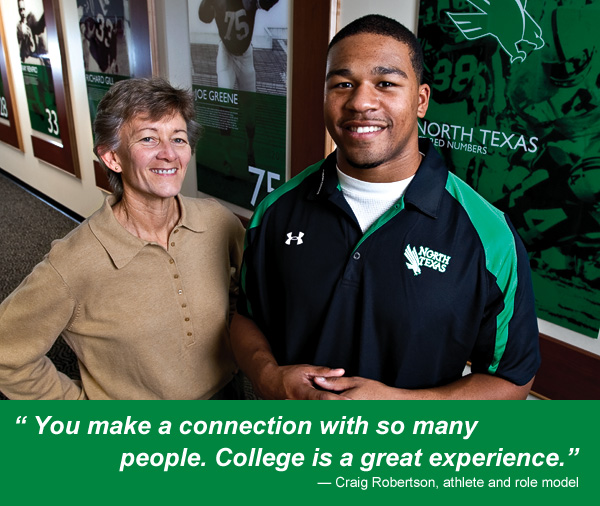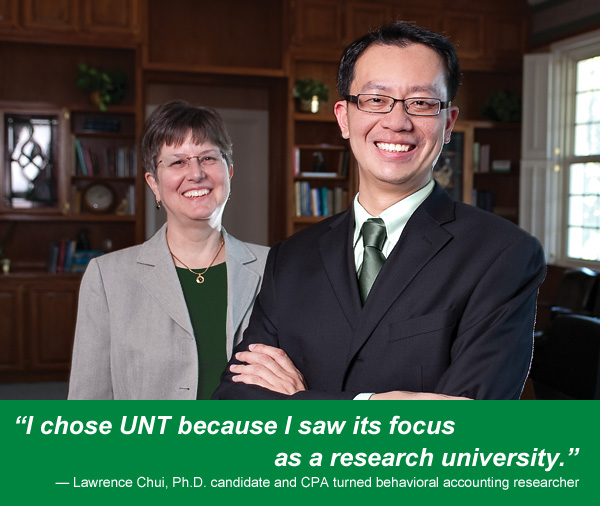March 30, 2010
At UNT, students are gaining the foundation they need to lead Fortune 500 companies, community organizations, classrooms, orchestras and laboratories. And today’s students already are using their talents to make a difference in their local communities while reaching out to help others across the globe.
UNT’s student-centered focus means students’ individual strengths are recognized and nurtured by faculty members, who have an interest in helping students from all backgrounds excel and achieve their goals while using their knowledge about their specific fields of study.
“Our faculty and staff members are committed to guiding students along their path so that they leave UNT with the hands-on experience they need to be successful in their future careers,” says Wendy K. Wilkins, provost and vice president for academic affairs. “Often, it is the personalized relationships UNT students develop with mentors that bring their college experience to the next level — ensuring dreams become realities.”
Across the disciplines in undergraduate and graduate classrooms, new discoveries are being made that launch budding careers. And faculty mentorships coupled with real-life experiences ensure students hone their talents and empower them to follow their passions.
Whether it’s an international graduate student making music and medical discoveries, a nontraditional transfer student balancing a family with school and military obligations, or a first-generation student educating future generations, UNT is committed to the successes of each individual student.

Marcelo Ostria, Honors College senior, with mentors Emile Sahliyeh (center), professor
of political science, and James Duban, director of the Office for Nationally Competitive
Scholarships (Photo by Gary Payne)
Marcelo Ostria saw the world as the son of a Bolivian diplomat. He also saw the horrors of poverty and oppression.
So, the Honors College senior got involved with the UNT UNICEF chapter. And with the help of faculty sponsor Emile Sahliyeh, professor of political science and director of international studies, Ostria spearheaded an effort that so far has raised more than $21,000 in the last two years toward UNICEF’s Help Us Save Some Lives Campus Challenge to help oppressed children. It was the most raised by any university.
“UNT has provided me with the opportunities and resources to work and mobilize other students to bring about change,” Ostria says.
His volunteer efforts, which also include traveling to Nicaragua to help build a medical clinic, earned him two back-to-back U.S. President’s Volunteer Service Awards, recognition as a Harry S. Truman Scholarship finalist and a spot on USA Today’s 2009 All-USA College Academic Third Team.
At the encouragement of James Duban, director of UNT’s Office for Nationally Competitive Scholarships, he applied for and earned a $25,000 Rotary Ambassadorial Scholarship for a 2010-11 study abroad program in Chile, where he will continue his volunteer service and train for an Ironman Triathlon to raise money for Rotary projects while starting his master’s degree.
“My UNT mentors believe in me and my work,” he says, adding that Sahliyeh helped him realize his research could reflect his interests and make an impact.
In summer 2009, Ostria researched the activism of U.S. Congress members in Latin American issues at the Democracy and World Politics Summer Research Program for Undergraduates at Oklahoma State University through a grant funded by the National Science Foundation. And as an NTDC intern in Washington, D.C., he saw firsthand how government can make a difference.
With a degree in international studies and political science, which he’ll earn this spring, Ostria plans to make his mark through public service — a goal that comes as no surprise to his mentors.
“Everything is possible as long as you set your mind to it,” Ostria says.

Jacqueline Benscoter (center), an education major, with mentors Kathryn Blanchard
(left), senior lecturer of teacher education and administration, and Jenny Davis Gaddis
(’02), a second-grade teacher at Chavez Elementary School in Little Elm. (Photo by
Gary Payne)
Jacqueline Benscoter started her first semester of student teaching last fall, nervous but ready. The hands-on skills she learned in her UNT courses and from working in Jenny Davis Gaddis’ second-grade class at Chavez Elementary School in Little Elm gave her the confidence to manage a classroom and teach students struggling with reading.
“UNT’s teaching program eases you into the classroom, so you feel prepared for the challenge,” says Benscoter, who already has passed her teacher certification exams.
Gaddis (’02) understands firsthand how important UNT’s education program is for budding educators.
“Meaningful lesson plans can only be successfully implemented once you’ve been in the classroom setting,” says Gaddis, who has taken Benscoter under her wing.
UNT’s year-long student teaching program requires students to take textbook theory and apply it in the classroom setting, says Kathryn Blanchard, senior lecturer in teacher education and administration who has mentored Benscoter.
“Students get a realistic idea of what the job of teaching really is,” Blanchard says. “Jacqui is an excellent student whose insight and passion for teaching shows.”
Since transferring from community college, Benscoter says she’s flourished in the student-centered environment UNT offers. She’s earned a near-perfect GPA and scholarships, while taking a full course load each semester and working part time. She already has passed her teacher certification exams.
Benscoter arrived at UNT with a passion for teaching because of her brother and adopted sister, who both had special needs and struggled in school. With all she’s learned at UNT, which prepares more than 900 teachers a year, she says she is ready to help even the most challenged elementary students get the education they deserve.
“I am grateful for the support I’ve received at UNT, because I will be the first in my family to graduate from college,” says Benscoter, whose parents earned their GEDs and have been supportive of her college career. “Getting my college education has been the most important thing.
“UNT turned out to be a perfect fit.”

Eri Yoshimura, as a doctoral student, with mentor Kris Chesky, associate professor
and director of UNT’s Texas Center for Music and Medicine. (Photo by Jonathan Reynolds)
Eri Yoshimura’s petite hands are makers of music, but also a source of pain.
“Sometimes I have to stop practicing the piano because my hands hurt when I’m stretching for big chords,” she says. “I was interested in UNT’s unique music and medicine program, because I wanted to help other musicians struggling with this issue.”
In her research, Yoshimura (’00, ’03 M.M., ’09 D.M.A.) focuses on discovering ways to reduce pain for pianists, including the possible application of smaller keyboards for small-handed pianists.
After coming to UNT from Japan in 1998, Yoshimura earned degrees in piano performance with plans for teaching. During her doctoral studies, Kris Chesky, associate professor of music and director of UNT’s Texas Center for Music and Medicine, encouraged her to tap into her personal experiences to yield even more meaningful discoveries.
“Eri has the ability to move purposefully to acquire knowledge and skills, and she has become extremely efficient in research data analysis and model building,” he says.
Yoshimura credits the program’s exceptional research tools — specialty cameras and sensors — with helping her achieve a more detailed analysis. And as a teaching assistant and fellow for 150 students in Chesky’s occupational health course, Yoshimura says she gained confidence as a speaker and presenter using English as her second language, skills she’ll use as a teacher one day.
“Dr. Chesky has encouraged my research and helped me get funding and opportunities to present at conferences,” adds Yoshimura, who has presented her research in the United States, Serbia and England and has been published in the Medical Problems of Performing Artists journal and Music Teachers National Association e-journal.
“At UNT, I get to play the piano and conduct research at the same time. It’s been an amazing experience.”

Jeff Helstad (right), soldier and materials science senior, with mentors Srinivasan
Srivilliputhur and Thomas Scharf, assistant professors of materials science and engineering.
(Photo by Mike Woodruff)
As an active Army National Guard soldier, Jeff Helstad understands firsthand the lifesaving impact of advanced materials. One of 11 materials science majors nationwide to earn the prestigious Science, Mathematics and Research for Transformation scholarship from the U.S. Department of Defense, the senior is part of a research team developing new hybrid materials, titanium alloys and nickel-based superalloys for stronger, better-performing aircraft components.
With the support of faculty mentors Srinivasan Srivilliputhur and Thomas Scharf in UNT’s Institute for Science and Engineering Simulation, Helstad, a married father of four, is conducting research with the U.S. Air Force that will result in a longer-lasting, safer aircraft fleet.
“Dr. Scharf and Dr. Srivilliputhur helped me to understand the fundamentals, and if I have a question, they are right down the hall and always more than willing to help,” Helstad says. “It makes a big difference.”
The low student-faculty ratios and excellent facilities in the College of Engineering have provided Helstad with numerous hands-on opportunities to apply his research.
“We have a lot of synergy that we pass on to our students,” Scharf says. “We want to give them a better understanding of the interdisciplinary nature of materials.”
Helstad sees his career in materials science as a natural fit for someone who likes to tinker and explore.
“It’s a great opportunity to develop and create new technology that will advance the air and space industry,” he says. “We’ve got one of the best labs in the nation as far as materials science goes.”
At UNT, Helstad has access to world-class equipment, such as a local electrode atom probe to characterize 3-D objects on an atomic scale, knowledgeable professors and a unique program.
The senior is set to deploy to Iraq or Afghanistan this fall and will come home to a job at the Air Force Research Laboratory, one of the country’s premier laboratories, thanks to his Department of Defense scholarship.
“For me, this research is just another way to serve my country,” he says.

Craig Robertson, a star linebacker and senior set to graduate in 2010, with mentor
Jan Hodges, coordinator of UNT’s recreation and leisure studies program. (Photo by
Gary Payne)
As a starting linebacker for the Mean Green, Craig Robertson is a leading tackler and leads the team in interceptions. His records earned him a Sun Belt Conference honorable mention in 2008 and 2009, as well as the Byron Gross Award for the team’s most outstanding linebacker in 2009. And he is ready to excel again in his final season with the Mean Green this fall.
But the student-athlete also makes an impact off the field. Robertson, who is majoring in recreation and leisure studies with an emphasis in sports management while preparing to pursue an M.B.A. at UNT next fall, works with young students at a local school, teaching them the importance of exercise and healthy eating habits. He began volunteering as a class project, but the star athlete kept returning.
“I saw one of the kids in the store, and he asked me when I was coming back,” Robertson says. “I thought he recognized me from playing football, but he recognized me from my volunteering. It changed a lot in me.”
Jan Hodges, associate professor and coordinator of UNT’s recreation and leisure studies program, opened the door to volunteering for Robertson.
“Craig stood out to me because of his excitement, spirit and interest,” Hodges says. “He understands the discipline it takes to succeed — something that I think he has learned as an athlete — and then he transfers it into the classroom.”
She says one of the lessons her students learn through volunteering is that “mentoring goes both ways — the mentee and the mentor gain so much.”
Robertson says when his turn came to be a mentor, he knew just where to look for a perfect example.
“Dr. Hodges really cares about her students,” he says. “If you don’t know something, she takes her time to explain it.
“She taught me, and now I’m teaching someone else.”

Lawrence Chui, a Ph.D. student in accounting, with mentor Mary Curtis, associate professor
of accounting. (Photo by Gary Payne)
Lawrence Chui, a doctoral student in accounting, compares his research to police work. Auditors are like patrolmen as they monitor financial statements.
He’s trying to help them think more like detectives — or forensic accounting or fraud specialists — on the hunt for fraud and financial wrongdoing.
In a post-Enron era, Chui hopes his research will give companies and the public another layer of protection.
“If I can somehow help auditors think like forensic or fraud specialists, then they may identify problems sooner and stop fraud,” he says. “And that could save someone from losing their life savings.”
As a licensed CPA, Chui brings a working knowledge to his research and already is passing that along to students in UNT’s undergraduate accounting courses.
“I want to become a better teacher and a researcher who makes an impact,” he says.
He has earned numerous awards, including the 2009 American Accounting Association/Deloitte/J. Michael Cook Doctoral Consortium Fellow award and a 2008 Foundation for Applied Research grant from the Institute of Management Accountants.
He has honed his research through a mixture of psychology and accounting courses in a program known for exploring the human behavior that drives decisions. Faculty mentor Mary Curtis, an associate professor whose own auditing research focuses on judgment and decision-making, has guided Chui in his efforts to share his research with local companies.
“Lawrence’s willingness to work hard and take on projects results in his successes,” Curtis says.
Chui says he chose UNT for the superior faculty and research.
“UNT has a great reputation as a top national university, and the College of Business faculty have written tremendous publications,” he says. “I owe a lot to my professors.”